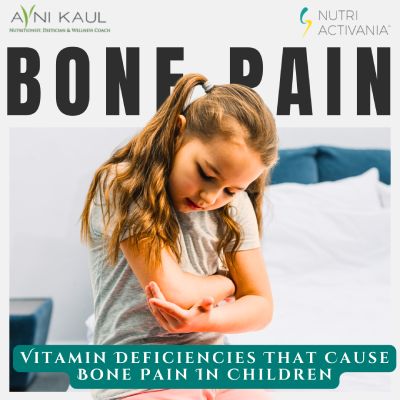Pain in any part of the body can lead to significant discomfort, and while over-the-counter medications may offer temporary relief, they do not address the underlying issue. Without proper diagnosis, untreated pain can escalate, potentially leading to severe complications. This is especially true when it comes to bone pain in children.
While such pain might be attributed to something as harmless as growing pains, it could also signal more serious conditions, ranging from infections and inflammation to structural bone issues or even malignancies. Interestingly, vitamin deficiencies are another potential cause of bone pain in children. Let us learn more about the vitamin deficiencies that can cause bone pain in children from leading child nutritionist, and dietitian in Delhi and Gurgaon, Avni Kaul.
How can vitamin deficiencies affect bone health in children?
We all know that vitamins and minerals are essential for growth, development, and good health. Here is how deficiencies in key vitamins can impact your child’s bone health:
- Vitamin D: Helps absorb calcium and phosphorus, critical for strong bones. A deficiency can lead to rickets, a condition where bones soften and weaken. Low vitamin D may also result in insufficient calcium, causing muscle cramps or seizures, particularly in newborns.
- Vitamin C: Crucial for collagen production in bone matrix and scavenging harmful free radicals. A deficiency can impair bone tissue formation, leading to bone lesions, poor growth, weakened capillaries, hemorrhages, and defective bone and related structures.
- Vitamin B12: Vital for bone marrow health. A deficiency can cause bone marrow aplasia, leading to extramedullary hematopoiesis and splenomegaly. It can also cause irreversible neurological damage, growth retardation, convulsions, and subacute combined degeneration, which affects sensory function and movement.
Rickets caused by Vitamin D Deficiency
Children with low vitamin D levels often complain of bone and muscle pain, which can lead to soft bone issues like rickets. This condition causes a child’s bones to become soft, leading to warping, bending, and an increased risk of fractures. Rickets are specific to children, as their bones are still growing. A similar condition in adults, known as osteomalacia, does not cause bowed bones. Vitamin D deficiency is often silent but can manifest through various symptoms in both children and adults.
Children may start walking late or prefer sitting for prolonged periods, while adults may experience chronic muscle aches and periosteal bone pain, detected with firm pressure on the sternum or tibia. If your child frequently feels sick, tired, or shows any of the following symptoms, it is advisable to seek medical advice and possibly a blood test to check their vitamin D levels:
- Bowing of leg bones
- Widening of knees (in children who can walk) or wrists (in infants who can crawl)
- Bone pain
- Swelling of the ends of ribs, known as rachitic rosary
- Pigeon chest (breastbone pressing outward or upward)
- Growth delays
- Unusual curving of the spine or shape of the skull
- Teeth problems, such as cavities
- Seizures (in severe cases where calcium levels are critically low)
What are the prevention and treatment of vitamin D deficiency in children?
To ensure children receive the vital nutrients needed for their physical and mental development, it is essential to focus on a balanced diet that includes vegetables, fruits, dairy products (such as milk, yogurt, butter, and cheese), and vitamin D-rich foods. Since vitamin D is a fat-soluble vitamin, it must be consumed in appropriate amounts to avoid toxicity. A doctor can guide you on the correct dosage for your child, which might include supplements taken daily or weekly, depending on their needs. To prevent vitamin D deficiency, incorporate the following into your child’s diet:
- Fortified baby formula, milk, orange juice, or yogurt
- Cooked salmon, mackerel, or canned tuna
- Fortified cereals or bread
- Cod liver oil
- Vitamin D-rich vegetables like spinach, kale, okra, and collard greens
- Egg yolks
Vitamin D is crucial for healthy bones and aids in bone healing after trauma or surgery. To prevent deficiencies:
- Encourage outdoor play to increase sun exposure.
- Address any chronic conditions that might impede nutrient absorption.
Ensuring a well-rounded diet and appropriate sun exposure can help maintain your child’s vitamin D levels and overall health.
What is the treatment of vitamin C deficiency in children?
To prevent Vitamin C deficiency in children, it is essential to include plenty of fruits and vegetables in their diet, especially those high in Vitamin C like citrus fruits, strawberries, bell peppers, and broccoli. If needed, Vitamin C supplements can also be considered, but only under a doctor’s supervision.
Once you understand the vital role vitamins play in bone health, it is easier to ensure your child receives the necessary nutrients to prevent deficiencies. A balanced diet rich in vitamins and minerals combined with proper sun exposure, can safeguard against bone pain and other related issues, promoting your child’s overall growth and well-being. Always consult a doctor and a nutritionist for the best results.



